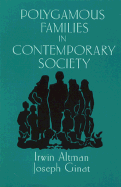Book contents
- Frontmatter
- Contents
- Foreword
- Preface and acknowledgments
- 1 Introduction
- Historical background
- Early stages of relationships
- 5 Deciding to add a new wife to a family
- 6 Courtship
- 7 Wedding and marriage ceremonies
- 8 Honeymoons
- 9 Adjusting to a new plural marriage
- Home environments of plural families
- Managing everyday life
- Social-emotional and family relationships
- Appendix A Methodology and procedure
- Appendix B Demographics of Mormon polygyny
- Notes
- References
- Index
5 - Deciding to add a new wife to a family
Published online by Cambridge University Press: 05 May 2010
- Frontmatter
- Contents
- Foreword
- Preface and acknowledgments
- 1 Introduction
- Historical background
- Early stages of relationships
- 5 Deciding to add a new wife to a family
- 6 Courtship
- 7 Wedding and marriage ceremonies
- 8 Honeymoons
- 9 Adjusting to a new plural marriage
- Home environments of plural families
- Managing everyday life
- Social-emotional and family relationships
- Appendix A Methodology and procedure
- Appendix B Demographics of Mormon polygyny
- Notes
- References
- Index
Summary
Adding a new wife to a fundamentalist family is usually approached with considerable thought and deliberation and ideally requires approval by a fundamentalist group's prophet, the prospective wife's parents, and an established wife or wives. Although a possible new marriage is a significant religious matter, it is also an important interpersonal or dyadic event involving a prospective husband and wife and an important communal issue of relationships between potential co-wives.
The decision-making process by which a woman joins a family as a co-wife varies across fundamentalist groups. In the urban community, the participants themselves – a husband, his wife or wives, and a prospective wife – play an active role in initial explorations of marriage possibilities. Although the group's leader must approve, individuals have considerable latitude to pursue possible relationships. In the rural community, the prophet plays a strong role in arranging marriages, sometimes without consulting prospective partners or families in advance, and sometimes with input by parents and participants themselves. Furthermore, the process in both fundamentalist groups varies from family to family and marriage to marriage, depending on relationships between husbands and wives and other factors.
The decision to add a wife to a fundamentalist family is rooted in religious values promoting the idea that a righteous patriarch should participate with good women in creating a proper and upstanding family.
- Type
- Chapter
- Information
- Polygamous Families in Contemporary Society , pp. 89 - 108Publisher: Cambridge University PressPrint publication year: 1996

